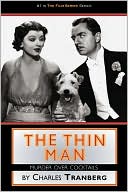Booze News: First ARTHUR, Now THE THIN MAN?
>> Saturday, October 30, 2010

 Unoriginality is rampant in Hollywood, and it appears that the new target for motion picture remakes is classic soused cinema. First Spielberg planned to direct a retread of Harvey (1950), a project which eventually imploded. Then Russell Brand decided to step into the shoes of the late Dudley Moore to play the lovable lush Arthur Bach in an updated version of the 1981 classic. Now New York Magazine's Vulture blog is reporting that Johnny Depp wants Rob Marshall to direct him in a remake of The Thin Man (1934).
Unoriginality is rampant in Hollywood, and it appears that the new target for motion picture remakes is classic soused cinema. First Spielberg planned to direct a retread of Harvey (1950), a project which eventually imploded. Then Russell Brand decided to step into the shoes of the late Dudley Moore to play the lovable lush Arthur Bach in an updated version of the 1981 classic. Now New York Magazine's Vulture blog is reporting that Johnny Depp wants Rob Marshall to direct him in a remake of The Thin Man (1934). As much as I love Depp (especially his work in Ed Wood), I just don't see him as the urbane, drunky sleuth Nick Charles. Johnny will probably do a decent job, but if I was going to recast the William Powell part for the 21st Century, Robert Downey Jr. seems better suited to the role. Still, why tamper with a classic? Trying to recreate the William Powell/Myrna Loy chemistry with another pair of actors seems a near impossible task. It certainly didn't work with the short-lived 1957 Thin Man TV show or the 1990 Broadway musical Nick & Nora (which ran a whole 9 performances).
As much as I love Depp (especially his work in Ed Wood), I just don't see him as the urbane, drunky sleuth Nick Charles. Johnny will probably do a decent job, but if I was going to recast the William Powell part for the 21st Century, Robert Downey Jr. seems better suited to the role. Still, why tamper with a classic? Trying to recreate the William Powell/Myrna Loy chemistry with another pair of actors seems a near impossible task. It certainly didn't work with the short-lived 1957 Thin Man TV show or the 1990 Broadway musical Nick & Nora (which ran a whole 9 performances). Of course, if Johnny Depp wants to do it, he has the clout to make the movie happen. But even if the project does get off the ground, it may be several years before it hits the multiplex. Depp has The Tourist, Rango, and The Rum Diary (based on the Hunter S. Thompson novel) in the can. He's currently filming Pirates of the Caribbean: On Stranger Tides, and there has been talk of him starring as Tonto in a new Lone Ranger film and as Barnabas Collins in a Tim Burton remake of Dark Shadows. Let's hope another property catches Johnny's fancy, so he'll leave Nick and Nora Charles alone.
Of course, if Johnny Depp wants to do it, he has the clout to make the movie happen. But even if the project does get off the ground, it may be several years before it hits the multiplex. Depp has The Tourist, Rango, and The Rum Diary (based on the Hunter S. Thompson novel) in the can. He's currently filming Pirates of the Caribbean: On Stranger Tides, and there has been talk of him starring as Tonto in a new Lone Ranger film and as Barnabas Collins in a Tim Burton remake of Dark Shadows. Let's hope another property catches Johnny's fancy, so he'll leave Nick and Nora Charles alone. Here's a link to the original Vulture post:
Here's a link to the original Vulture post:
Johnny Depp wants Rob Marsall to direct him in a Thin Man remake
By the way, the post mentions that Dashiell Hammett never wrote a sequel to his novel, The Thin Man. That isn't strictly true. Hammett wrote the original stories for the first three Thin Man films, which screen writers Frances Goodrich and Albert Hackett used as an outline. Hammett's story, After the Thin Man, has even been published in The New Black Mask, Nos. 5 and 6.
Cheers,
garv














































